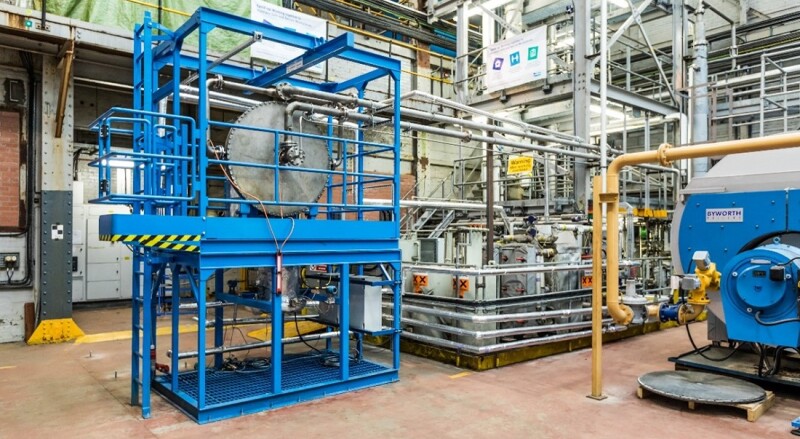Could you tell us about your academic and professional journey?
Prateek Bumb and I co-founded Carbon Clean 13 years ago while we were both studying at the Indian Institute of Technology (IIT) Kharagpur. I was studying for a master’s in statistics, and Prateek was studying for a master’s in engineering.

Sharma
At that time, it wasn’t common for students in India to start a business while still at university, and, within our university system, there was no way to pause your education and take some time out. When we were offered a trip to Silicon Valley, we had to miss some classes and important exams. But we decided to take that risk, and it paid off. It was challenging setting out without any examples of similar student start-ups to learn from. Today, of course, there are many such examples.
Another early challenge was that we had very little data to demonstrate the superiority of the carbon-capture solvent we were developing. We managed to secure funding from the Three F’s—friends, family, and fools—raising $26,000, which was sufficient to lease a small lab and start working on testing to gather the data.
From that start, we have gone on to receive funding from both the British and US governments, and our recent Series C funding round was for $150 million, a record amount for a point-source carbon-capture company. We are now headquartered in the UK and employ over 70 people worldwide, so it’s been an exciting and rewarding journey.
What is the philosophy behind Carbon Clean?
We know that carbon capture and storage is central to climate mitigation strategies and achieving net zero (the recent IPCC Sixth Assessment Report confirms this). We also know that capture, utilization, and storage (CCUS) technologies are one of the few technology options that can significantly reduce CO2 emissions from heavy industry. However, current IEA projections highlight that CCUS capacity deployment must be 50% higher than currently predicted trajectories if the world is to reach net zero by 2050.
Scaling CCUS deployment through innovation is at the heart of Carbon Clean.
From the outset, Prateek and I had a vision to deliver industrial decarbonization on a gigatons scale through point-source carbon capture, and today we are on track to achieve this vision by the mid-2030s.
We want to revolutionize the carbon-capture industry with breakthrough innovation and products that move the sector away from costly, large, and complex technologies to modular solutions that can be delivered in a matter of weeks and scaled in line with a company’s decarbonization ambitions and investment capacity.
We intend to make the business case for industrial carbon capture undeniable and, through our technology, to make a sizable dent in global industrial emissions, which account for 30% of total man-made carbon emissions.
What differentiates Carbon Clean among other solution providers?
Carbon Clean is revolutionizing the trillion-dollar industrial decarbonization space for essential hard-to-abate industries such as cement, steel, refineries, and energy from waste. Retrofitting point-source carbon capture technology in these plants allows them to start decarbonizing now, meeting regulatory requirements and investor/customer expectations.
However, for years, cost and space concerns have impacted the widespread adoption of carbon capture technology. Our cutting edge, modular, and semimodular technologies offer solutions that are both scalable and cost-effective.
In particular, our fully modular technology, CycloneCC, will move these sectors away from large, expensive technologies to compact and standardized solutions that can be mass produced, prefabricated, and delivered in a matter of weeks, reducing the overall cost of carbon capture by up to 50%.
We will work in collaboration with industrial partners and governments to manufacture and ship hundreds of these carbon-capture units to industrial facilities every year. In short, we are aiming to become the Tesla of carbon capture, achieving the scale and pace of CCUS rollout that is necessary to deliver net zero.
What industries will benefit the most from carbon capture?
CCUS is particularly vital for hard-to-abate sectors such as cement, steel, refineries, and energy-from-waste. In the past, complex production processes and energy demands have made decarbonization difficult. These sectors have also received relatively little attention compared to the focus on energy efficiency, renewables, and consumer behaviors. They are not easily replaced, and CCUS provides the only mature and cost-effective option for reducing emissions both from production processes and energy usage from heat demand.
Our technology has been proven at scale in over 44 sites around the world, including plants in the UK, US, Japan, Germany, India, Norway, and the Netherlands. We have also delivered the world’s largest industrial-scale carbon capture and utilization plant for Tuticorin Alkali Chemicals and Fertilizers Limited in India.
Carbon Clean has partnerships with leading businesses in all these sectors, including CEMEX, Chevron, Tata Steel, and Veolia, and it is these technology deployment partners that are accelerating the rollout of the commercial scale-up of our modular technology for the market.
How will the Carbon Clean/Chevron partnership help in realizing a low-carbon future?
As the lead investor in our $150 million Series C investment round, Chevron is a key partner for Carbon Clean. This partnership has the potential to drive exponential growth in the CCUS sector, building on Chevron’s long history of supporting innovation and commercializing breakthrough technologies.
Initially, we are seeking to develop a technology demonstration pilot that will test our fully modular CycloneCC technology on a Chevron gas turbine in San Joaquin Valley, California. This first-of-its-kind technology pilot will be important to understand how carbon-capture technology can be used at Chevron’s facilities and across multiple industries. Chevron is targeting 25 million tons of CO2 per year in equity storage by the end of this decade, with a focus on developing regional hubs that leverage its existing and emerging partnerships with customers, governments, and industry. The partnership with Carbon Clean will play an important role in helping advance Chevron’s pursuit of lower-carbon solutions and forms part of its plans for a third-party solutions business that is focused on hard-to-abate industries such as cement, chemicals, and refineries.
(To learn more on how the two companies plan to work together watch this video discussion with Chris Powers, vice president of CCUS for Chevron New Energies.)
What is your advice to students and young professionals who are looking to venture into the start-up space?
Be aware that, for any start-up, the first year is all about pivots. You pivot, pivot, pivot until you get to the right location, the right product, and the right business model. We initially started as a consulting company, working with large power stations and steel plants, and it was a disaster. Within 6 months, we concluded that nobody wanted to get advice from 21-year-olds, so we pivoted and decided that we needed to come up with a tangible technology instead.
It's important to seek out, and listen to, experts—in your field and in the business of building companies. In 2009, we went to Silicon Valley and spent some time at Stanford University to learn from a couple of professors about the importance of carbon capture and where it fits within the wider energy system. We also had conversations with entrepreneurs who had gone on to build large companies, to learn from their experiences.
Launching a clean tech business now would perhaps be easier as there is much wider recognition that something must be done about industrial decarbonization, the investment community recognizes that CO2 is a big problem, and people are putting a significant value on carbon. It is also now much easier to attract bright people into your business. People want to join companies working in the sustainability space, that are making real impact on our lives.
Aniruddha Sharma, Carbon Clean's chief executive officer, has been instrumental in building and developing Carbon Clean into a global leader in cost-effective industrial carbon capture. With 44 sites currently operating across North America, Europe, and Asia capturing 1.5 million tonnes of CO2 using Carbon Clean’s technology and solvents. He leads and sets the company’s strategy and goals; represents Carbon Clean externally, including on a variety of industry bodies; and maintains overall responsibility for sales, marketing, and project delivery operations. Sharma is also chair of the company’s board. As of 2022, he has secured multiple strategic partnerships with global players to develop and invest in carbon-capture projects.


